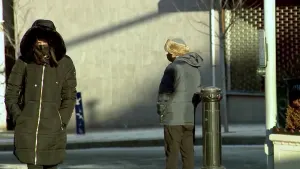More Stories
A Rockland County woman who survived breast cancer is urging other women to get screened for the disease, no matter their family history.
Doctors worry there are women with undiagnosed breast cancer because they've fallen behind on routine mammograms during the pandemic.
"I was the first one to go through this, so I was definitely very scared," Belkis Rosario recalls. Her big Dominican family is everything and in her family, there's no history of any type of cancer. So to her surprise, her first-ever mammogram when she turned 40 this year showed the earliest breast cancer - stage zero.
"I didn't even know that was a thing," she says. But now after one surgery, she's cancer-free.
"Aside from having so much fear after finding the diagnosis, I was completely grateful," Rosario says.
Not everyone detects it early like Rosario though.
According to the American Cancer Society, screenings went down by about 90% during the pandemic as people were afraid to go to hospitals.
"We do see that there are people who entirely skipped 2020 and even now are not rushing in 2021," Dr. Caren Greenstein, director of breast imaging at White Plains Hospital.
With delays to routine mammograms, there are worries that there could be many women who have breast cancer without knowing it.
"It's one out of every eight women in this country that does have breast cancer at some point during their lives, so nobody's at low risk," Greenstein says.
Greenstein says most new cancers are actually in women without family history like Rosario, so early detection is key.
"For stage zero cancers, the cure rate is basically 100%," Greenstein says.
But for those who catch it too late, doctors predict the death rate will be higher in five years.
"It could've definitely been different if I waited longer. Don't let life get in your way," Rosario says.
Greenstein's recommendation is for all women 40 and up get a mammogram once a year, every year. For women with family history of the disease, Greenstein advises to start as young as 30. She said it's a 10-minute process that could save one's life.
MORE:
More from News 12
1:31

What's Cooking: Uncle Giuseppe's Marketplace's prime rib roast
1:27

What's Cooking: Uncle Giuseppe's quiche lorraine
2:34

Guide: Safety tips to help prevent home burglaries
0:48

How to protect yourself against frostbite during arctic chill
2:19

Guide: Safety measures to help prevent fires and how to escape one
2:07
